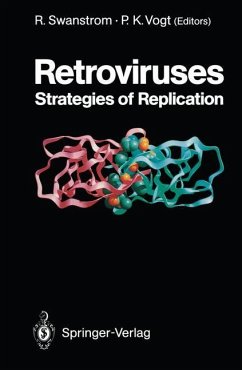
Herpes Simplex Virus
Pathogenesis, Immunobiology and Control
Herausgegeben von Rouse, Barry T.

PAYBACK Punkte
39 °P sammeln!
Although upstaged by the tragic appearance of the human immunodeficiency virus, herpes simplex viruses (HSV) types 1 and 2 continue to be major human pathogens against which we lack acceptable vaccines or other means of immunological control. The virus is large and complex, coding for 70 or more proteins. Although many mysteries remain to be unraveled, our knowledge base regarding genomic organization, gene expression and regulation, pathogenesis, and immune recog nition of component parts is quite considerable. Indeed, meet ings devoted entirely to herpesviruses are conspicuous by their frequ...
Although upstaged by the tragic appearance of the human immunodeficiency virus, herpes simplex viruses (HSV) types 1 and 2 continue to be major human pathogens against which we lack acceptable vaccines or other means of immunological control. The virus is large and complex, coding for 70 or more proteins. Although many mysteries remain to be unraveled, our knowledge base regarding genomic organization, gene expression and regulation, pathogenesis, and immune recog nition of component parts is quite considerable. Indeed, meet ings devoted entirely to herpesviruses are conspicuous by their frequency and excellent, yet sometimes exclusive, attendance. The purpose of this volume is to compile in a single book a series of reviews by leading investigators that deal with various aspects of virus-host interactions and which hopefully will pro vide clues as to how to best manage HSV from an immunobio logical perspective. Ultimately, one anticipates that a full under standing of virus-hostinteraction will lead to strategies useful for the prevention and control of HSV. The state of current progress with conventional vaccines is presented, as is a chapter on intracellular immunization. This latter novel approach to virus infections comes at approximately the bicentenary of Jenner's introduction of a successful conventional immunization strategy.














